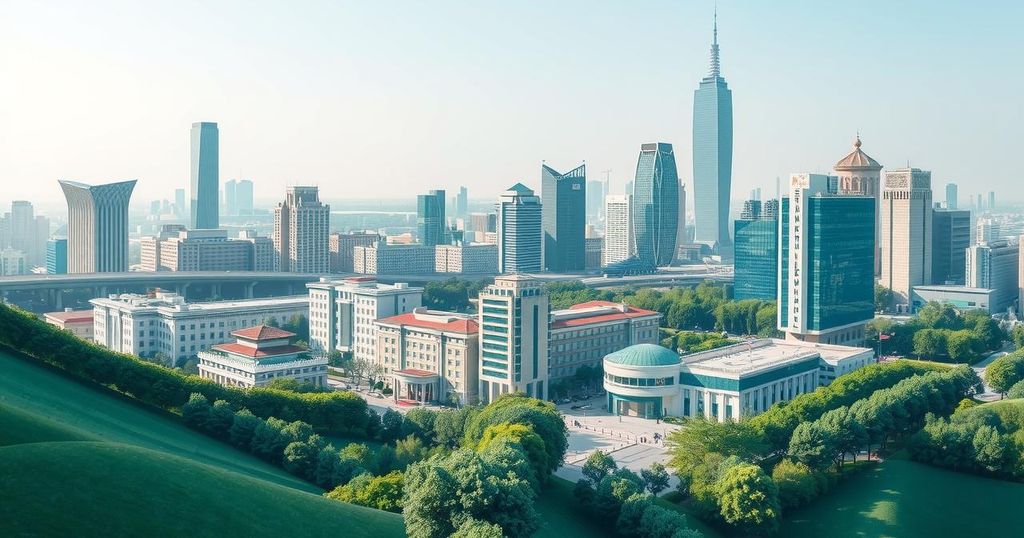World news
” ROACH, AMERICA, AMERICAN, ASIA, BEIJING, BIDEN ADMINISTRATION, CENTER, CENTER FOR STRATEGIC AND INTERNATIONAL STUDIES, CHINA, CHINA DEVELOPMENT, CHINA DEVELOPMENT FORUM, CNBC, DONALD TRUMP, GEOPOLITICS, JEROME POWELL, MEXICO, NATIONAL SECURITY, NORTH AMERICA, PAUL TSAI CHINA CENTER, POLITICS, SCHOOL, STEPHEN ROACH, TRUMP, U. S, U. S. FEDERAL RESERVE, UNITED STATES, US-CHINA RELATIONS, WASHINGTON, D. C, WHITE HOUSE, YALE LAW, YALE LAW SCHOOL
Sofia Rodriguez
0 Comments
China Engages U.S. Business Leaders Amid Trade Tensions
This article discusses China’s recent outreach to U.S. business leaders at the China Development Forum, portraying a strategy to alleviate trade tensions with the U.S. amid ongoing tariff disputes. The forum featured high-profile executives and emphasized reassurance about China’s economic direction, while also hinting at significant diplomatic engagements ahead between U.S. and Chinese leaders.
China has invited major U.S. business leaders to an annual conference in Beijing, aiming to lessen trade tensions rather than escalate them. This initiative reflects China’s long-standing interest in attracting foreign investment to enhance economic growth and to influence U.S. policies, especially under President Trump, who has imposed increasing tariffs on Chinese goods. Meanwhile, China has only implemented select duties on a few American firms as a response.
During the China Development Forum held this week in Beijing, conversations indicated a more conciliatory approach, contrasting with recent aggressive rhetoric from China. Rather than focusing on retaliatory measures against U.S. tariffs, participants, including Stephen Roach from Yale Law School, expressed curiosity about Trump’s motivations and the implications of his trade policies. Roach remarked that this economic climate could lead to significant uncertainty globally for an extended period.
Investors within the U.S. stock market have reacted to the evolving trade situation, with fluctuations in response to Trump’s tariff announcements. U.S. Federal Reserve Chair Jerome Powell noted that these tariffs might hinder efforts to reduce inflation in the country. Observers indicated that the conference aimed to project assurance regarding China’s consumption strategies and economic trajectory, especially in light of potential upcoming tariffs.
Concerns about possible significant tariffs, which may be implemented soon, were prominent at the conference. Scott Kennedy of the Center for Strategic and International Studies highlighted that heightened anxiety over trade relations necessitated a reassuring message from China. Despite increasing trade ties with Southeast Asian nations and the European Union, the U.S. remains China’s largest single-country trading partner.
At the forum, attended by high-profile executives including Apple CEO Tim Cook, the overall sentiment was cautiously optimistic compared to the previous year, as noted by Citadel CEO Ken Griffin. He affirmed that Trump believes in maintaining global market access for American companies, even if that necessitates using tariffs.
A significant meeting took place when U.S. Republican Senator Steve Daines met with Chinese Premier Li Qiang, marking the first visit by a U.S. politician to China since Trump’s term began. Daines suggested that this meeting might pave the way for a future encounter between President Xi and President Trump, as Premier Li emphasized the need for cooperation to avoid a trade war.
The economic relationship with China is essential for numerous multinational companies, providing significant revenue and being integral to their supply chains. Nonetheless, China has issued warnings about potential retaliatory measures concerning U.S. tariffs while incrementally creating barriers to foreign businesses, particularly following U.S. sanctions on Huawei during Trump’s presidency.
Despite ongoing challenges, including deflationary pressures and a struggling real estate market, China has taken steps to stimulate economic recovery. Executives like Wendell P. Weeks of Corning expressed optimism regarding this recovery, while others noted that high-tech manufacturing support has been marginally beneficial, insufficient to counterbalance downward pressures from the real estate sector. Qualcomm’s Cristiano Amon echoed this sentiment, emphasizing technology’s crucial role in fostering economic growth.
In summary, China’s invitation to U.S. business leaders signals a more conciliatory approach amid rising trade tensions with the U.S. While the uncertainty surrounding Trump’s tariff policies raises concerns, China aims to reassure multinational corporations about its economic prospects. The recent interactions also suggest potentials for future diplomatic engagement between the two countries, despite the backdrop of escalating trade scrutiny.
Original Source: www.cnbc.com




Post Comment